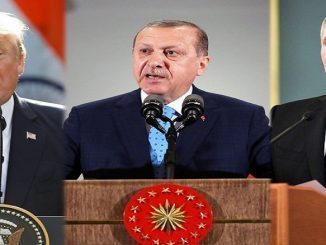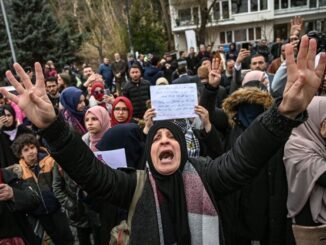
U.S. leader reversed policy to support Gen. Haftar against the U.N.-backed government after urging by Saudi Crown Prince Mohammed bin Salman and Egypt’s Abdel Fattah Al-Sisi
The administration of US President Donald Trump, under the influence of Egypt and Saudi Arabia, has decided to speak out in support of Field Marshal Khalifa Haftar, Commander of the self-styled Libyan National Army (LNA), according to an article published on The Wall Street Journal.
According to WSJ’s sources from the staff of the US administration and Saudi officials, “The leaders of Saudi Arabia and Egypt successfully lobbied US President Donald Trump to reverse U.S. policy in Libya and support a rogue general leading an offensive on a government in Tripoli backed by the United Nations, according to a senior U.S. administration official and two Saudi officials.”
Egypt’s Abdel Fattah al-Sisi and Crown Prince of Saudi Arabia Mohammed bin Salman Al Saud persuaded Trump to talk to Haftar on the phone. Both Arab leaders have both “thrown their support to Gen. Khalifa Haftar, a Libyan militia leader whose battle to capture Tripoli has plunged the country into another civil war. The two leaders view the Western-backed government in Tripoli as aligned with dangerous Islamic extremists and with regional rivals Turkey and Qatar. But there are hardline Islamists on both sides”.
Both Prince Mohammed and Mr. Sisi urged Mr. Trump on April 9 to talk to Gen. Haftar and support his cause, the administration official said—the prince in a phone call to Mr. Trump and the Egyptian president in a conversation at the White House. Saudi crown prince told Trump that the government in Tripoli is linked to the Islamic State and Al Qaeda terrorist groups. “Specifically, the prince told Mr. Trump that militias in Tripoli were affiliated with Islamic State and al Qaeda,” according to the WSJ.
During a telephone conversation on April 15, Trump made Haftar understand that he supported him. Trump’s decision was a departure from the longstanding US policy in Libya, under which Washington supported the Government of National Accord (GNA) in Tripoli and interacted with its forces in the fight against the ISIS, according to the article which states that prior to the call from Trump, the State Department called for a ceasefire in Libya and condemned Haftar’s attack.
However, GNA Prime Minister Fayez al-Sarraj was not notified of changes in the US policy; and American diplomats in the light of what is happening are faced with serious difficulties in developing a new course on Libya, the article notes.
Gen. Haftar’s offensive, which began on April 4, has resulted in a full-blown proxy battle, pitting Middle Eastern and Western powers against one another in a fight for control of a major oil-exporting state on Europe’s doorstep.



